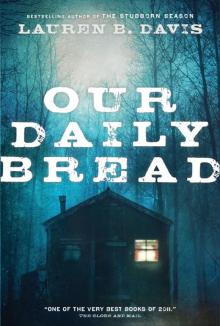Read Our Daily Bread Storyline:
"Backwoods Noir" at its best. For generations the Erskine clan has lived in poverty and isolation on North Mountain, shunned by the God-fearing people of nearby Gideon. Now, Albert Erskine comes down off the mountain hoping to change the future for his brothers and sisters and sets in motion a chain of events that will change everything. Inspired by a true story. From best-selling novelist Lauren B. Davis comes the deeply compassionate story of what happens when we view our neighbors as "The Other," as well as the transcendent power of unlikely friendships. OUR DAILY BREAD is a compelling narrative set in a closely observed, sometimes dark, but ultimately life-enhancing landscape. Lauren B Davis' vivid prose and empatheticaly developed characters will remain in the reader's mind long after the final chapter has been read." -- Jane Urquhart, prize winning author of AWAY and THE STONE CARVERS."I'll never forget this book, the sunning power of the descriptions, the attention to detail, the riveting plot, the fully-realized characters--this is storytelling at its very best." -- Duff Brenna, author of THE BOOK OF MAMIE, THE HOLY BOOK OF THE BEARD, TOO COOL"From the first chapter of OUR DAILY BREAD...I was hooked--by the characters, by the flow, by the clean, rhythmic prose." -- Thomas E. Kennedy, author of THE COPENHAGEN QUARTET"Rendered with gorgeous prose, this compact, fast-moving novel features an astonishing range of tones, from hope to heartbreak, from black humor to white-knuckle terror." -- Dexter Palmer, author of THE DREAM OF PERPETUAL MOTIONReview" Powerful, harrowing, and deeply unsettling. It keeps you reading as your blood pressure mounts...proceeds like a noose gradually tightening...stark, beautiful, sad and frankly terrifying*...finely crafted, with careful attention to characterization, style, and pacing. It succeeds on every level."--(Starred Review) The Quill & Quire"Absorbing, strikingly-written, and subtly-honed . . . a page-turner!" -- Gordon Hauptfleisch, blogcritics.org/books/article/book-review-our-daily-bread-a/"full of remarkable moments. . . a level of detail that puts us in the beating hearts of imperiled souls. . . . simple, brave, powerful scenes, skillfully written with an anger no less effective for being tempered - scenes that sit with the soul long after the book is closed." - Alan Cuymn, THE GLOBE & MAILLonglisted for the 2012 Scotiabank Giller Prize. Named as one of the "Very Best Books of 2011" by THE GLOBE & MAIL and the BOSTON GLOBE."Thrilling . . unflinching . . unforgettable. Davis makes us care about her characters . . imaginatively transformed by exquisite prose. Her moral fiction calls us to empathize, read, imagine and hear. This is a story of getting lost in the woods, of meeting the monster and getting out alive." Jean Randich, Truthdig.com **From the AuthorOne of the things I've been troubled by in the past few years is the increasing polarization I see around me. It pops up in any number of places - religion, politics both local and international, public rhetoric, the media, etc. We don't have to look far for examples - perhaps no farther than our prisons, or the town next door, or even in our own families.I write to figure out what I think about things and to attempt to find meaning. I try to find metaphors in which to explore my feelings and thoughts on what obsesses me.As I pondered my concerns about the ever-widening gaps I noticed around me, a story from my past kept rising to the surface. I lived in Nova Scotia for a brief time in 1972-1973. While there, I heard stories about a community up on a nearby mountain. They were terrible stories, involving incest, aborted and deformed babies, prostitution, bootlegging and so forth. I told myself these dreadful tales couldn't be true. I believed, naively, that if they were true, surely someone would have done something about it. Then, in the early 1980s one of the children of the Goler clan told her story of generational abuse to a teacher. This teacher came from another province and hadn't been in Nova Scotia very long. She in turn called an RCMP officer, who also hadn't been in the community for very long. They insisted an investigation begin and eventually many of the clan adults were in jail and the children in foster care. I was horrified, but also mystified. If all those rumors were true, why had it taken so long for someone to intervene? Well, the answer seemed to be that the people who lived on the mountain had, for generations, been considered "Those People" as in "What do you expect from those people?" The people who lived in the prosperous Annapolis Valley nearby, in communities founded hundreds of years earlier on Puritanical religious principles, believed their neighbors were so "Other" as to be beyond the pale.The extreme marginalization of the community and the terrible repercussions of ostracism haunted me and it seemed the perfect framework to explore how such ordinary people could do such dreadful things, or permit such dreadful things to continue. I have had several instances in my own life of feeling like the "Other." Although I explore the theme more personally in my previous novel, THE STUBBORN SEASON, in which a young girl battles the tyranny of living with a mentally ill mother during the Great Depression, in OUR DAILY BREAD the character of Ivy Evans is based on some of my own experiences with marginalization. My family, afflicted by mental illness and alcoholism, was going through a rough time the summer I was nine. I was an only child, and adopted, and rather bookish and prone to making up stories, all of which helped to make me 'Other' in the eyes of some of the children in the neighborhood. That summer, a lady who owned a little antique shop near my house let me hang around the store. I'm sure she never knew just how much that meant to me, but it was a refuge from loneliness and bullying and I've never forgotten it.*Pages of Our Daily Bread :
